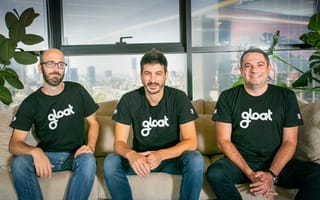
On Wednesday, Gloat, a talent marketplace that helps employees find internal work opportunities, announced it closed on a $57 million Series C led by Accel. The round brings the six-year-old company’s total funding raised to $92 million, and comes at a rather interesting time for the future of work.
“As companies are adapting their workforce to be more flexible and take advantage of remote workers, new tools are needed to optimise productivity and ensure equality of opportunities,” Philippe Botteri, a partner at Accel, said in a statement provided to Built In. “The Accel team is looking forward to partnering with Gloat on the next stage of its journey, bringing this fundamentally new way of developing talent and managing work to every global enterprise.”
Gloat’s story begins around 2008, when the small tech company that co-founder and CEO Ben Reuveni was working for at the time got acquired by IBM. As an IBM employee, he says he began to notice the “silos” in the organization.
“I saw the lack of visibility for me as an employee to see how I can navigate my career within the company,” Reuveni told Built In. “I had two options — to explore outside of the company, or to explore internally. What is interesting is that exploring outside of the company was much easier for me than exploring internally.”
Gloat aims to help solve that problem by providing a place where a company’s employees and managers can connect with each other. Using AI, the platform automatically creates a career path for a given employee within the organization, and then shows opportunities within their company that can help them reach their goals. This can be open full-time positions, part-time projects, mentoring and shadowing opportunities — “everything that relates to career movement within a company,” says Reuveni.
Today, major brands like Unilever, Nestlé and MetLife use Gloat. In just the last year, the company’s customer base has grown 4x, and its ARR grew 5x. Reuveni says much of this success can be attributed to the pandemic, which has forced nearly every company to be more resourceful and agile. These days, a small company can blow up and a large company can tank seemingly overnight, so they need to be ready to tap into their team’s talent more efficiently.
For example, Reuveni says that, during the height of the pandemic, certain departments in Unilever were underworked while other departments were completely swamped. So, the company used Gloat to reallocate some of its underutilized staff over to the overworked side to help complete projects. In the end, Unilever resourced more than 4,000 business projects thanks to Gloat, including the launch of a new ice cream product and about a dozen new hygiene products to meet surging demand.
Looking ahead, Reuveni predicts that the need for tech like Gloat’s will continue to be a critical component of companies’ internal recruitment efforts. Although we appear to be coming out of the worst of the pandemic, the last 15 months will certainly have a lasting effect on how businesses operate. For instance, many large companies have shifted to a permanent “hybrid” model in which employees are only expected to work at the office a few days out of the week, completely changing what the “work environment” will look like.
“In the past, if you wanted to find your next career opportunity within the company, 95 percent of the time you were able to do that because you met someone in the hallway or at the elevator,” Reuveni said. “Now, even that you don’t have. When everything is hybrid, you need to strengthen that connection somehow. You need some technology to navigate that.”
To keep up with this growing need, Reuveni says Gloat will use this fresh funding to further invest in its product and R&D efforts, as well as grow its sales and customer success teams. In the next year he says the company’s global headcount will likely double, which means it will double its NYC office as well.




